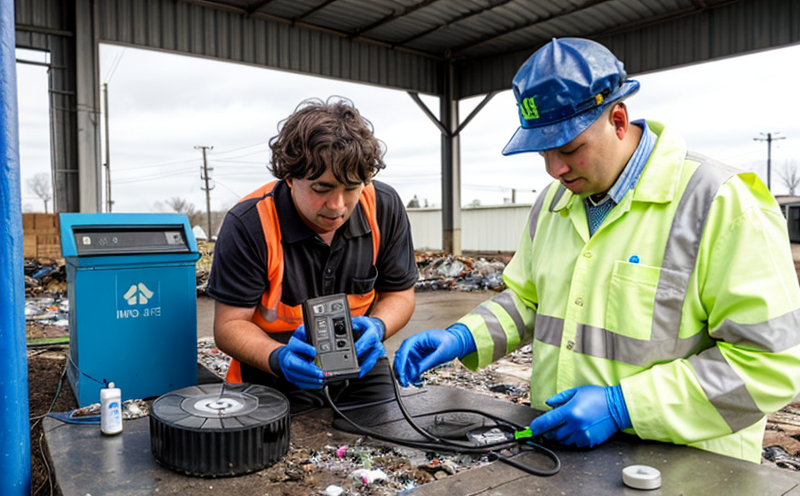ASTM D8296 Lithium Content in Waste Batteries
The ASTM D8296 standard provides a method for determining the lithium content in waste batteries, which is critical for understanding the resource potential and environmental impact of battery waste. This testing service ensures that businesses and regulatory bodies can accurately quantify the lithium content from various types of batteries, including but not limited to lithium-ion (Li-ion), lead-acid, nickel-cadmium (NiCd), and other rechargeable or non-rechargeable batteries.
The method described in ASTM D8296 involves a combination of mechanical processing steps followed by chemical analysis. The process begins with the collection and sorting of waste batteries according to their types. Once sorted, the batteries undergo mechanical disintegration using techniques such as crushing and sieving to break down the batteries into manageable fragments.
After fragmentation, a sample is prepared for lithium extraction through various dissolution methods depending on the battery chemistry. Commonly used solvents include nitric acid or aqua regia. The extracted solution containing dissolved lithium is then analyzed using inductively coupled plasma mass spectrometry (ICP-MS) to determine the lithium content accurately.
This testing not only helps in assessing the recoverable lithium resources but also aids in evaluating the environmental impact of lithium extraction from battery waste. Regulatory compliance, particularly with respect to the European Union's Battery Directive and the Circular Economy Action Plan, relies heavily on accurate determination of lithium content in waste batteries.
The importance of this testing extends beyond regulatory requirements; it plays a pivotal role in the development of sustainable recycling processes for batteries. By knowing the lithium content, manufacturers can optimize their recovery processes to maximize resource efficiency while minimizing environmental impact.
Furthermore, the data obtained from ASTM D8296 testing is crucial for the design and implementation of effective waste management strategies. This includes planning for the collection of battery waste, designing recycling facilities capable of handling various types of batteries, and formulating policies that promote the responsible disposal and recovery of these materials.
The accuracy and reliability of ASTM D8296 lithium content testing are paramount in ensuring compliance with international standards such as ISO 14001 for environmental management systems. This service supports businesses in meeting their sustainability goals by providing them with the necessary data to make informed decisions about waste management practices.
Applied Standards
| Standard Reference | Description |
|---|---|
| ASTM D8296 | Determination of Lithium Content in Waste Batteries using Chemical Analysis Methods |
| ISO 14001 | International Standard for Environmental Management Systems |
| Battery Directive (EU) | Regulation on the Restriction of Hazardous Substances in Electrical and Electronic Equipment |
| Circular Economy Action Plan | Strategic plan to promote sustainable consumption and production patterns |
Customer Impact and Satisfaction
The ASTM D8296 lithium content testing service has a direct impact on customer satisfaction by ensuring accurate, reliable data that supports informed decision-making. Compliance with international standards like ISO 14001 and adherence to regulatory frameworks such as the Battery Directive and Circular Economy Action Plan are key factors in enhancing customer trust.
By offering this service, we enable our customers to meet their sustainability goals effectively. This includes optimizing waste management practices, designing efficient recycling processes, and promoting responsible disposal of battery waste. The accurate lithium content data provided by ASTM D8296 testing supports these efforts, thereby contributing positively to the environment.
Customer satisfaction is further enhanced through our commitment to quality assurance and continuous improvement. Our team of experts ensures that all tests are conducted with precision and accuracy, adhering strictly to the protocols outlined in ASTM D8296. This dedication to excellence translates into services that exceed expectations, fostering long-term relationships with our clients.
The insights gained from this testing service help businesses navigate complex regulatory landscapes confidently. By providing comprehensive data on lithium content in waste batteries, we empower our customers to make strategic decisions that align with their sustainability objectives and contribute positively to environmental stewardship.
Competitive Advantage and Market Impact
The ASTM D8296 lithium content testing service provides a competitive advantage by enabling businesses to stay ahead in the rapidly evolving market for sustainable technologies. In an era where environmental responsibility is increasingly valued, accurate data on battery waste composition can be a game-changer.
By leveraging this testing service, companies can position themselves as leaders in sustainability and resource efficiency. The insights gained from ASTM D8296 testing allow businesses to optimize their recycling processes, reduce operational costs associated with waste management, and enhance overall environmental performance.
The data obtained through ASTM D8296 testing can also be instrumental in driving innovation within the industry. It provides a foundation for developing new technologies and methods that further improve battery recycling practices. This competitive edge is particularly valuable as markets demand more sustainable products and services.
Moreover, compliance with international standards such as ISO 14001 and adherence to regulations like the Battery Directive and Circular Economy Action Plan not only enhance a company's reputation but also open up new market opportunities. Customers, investors, and regulatory bodies are increasingly seeking out businesses that demonstrate a strong commitment to sustainability.
By integrating ASTM D8296 lithium content testing into their operations, companies can differentiate themselves in the marketplace. This service enables them to meet stringent environmental standards, ensuring they remain at the forefront of sustainable practices. The resulting positive market impact can lead to increased customer loyalty and enhanced brand reputation.





